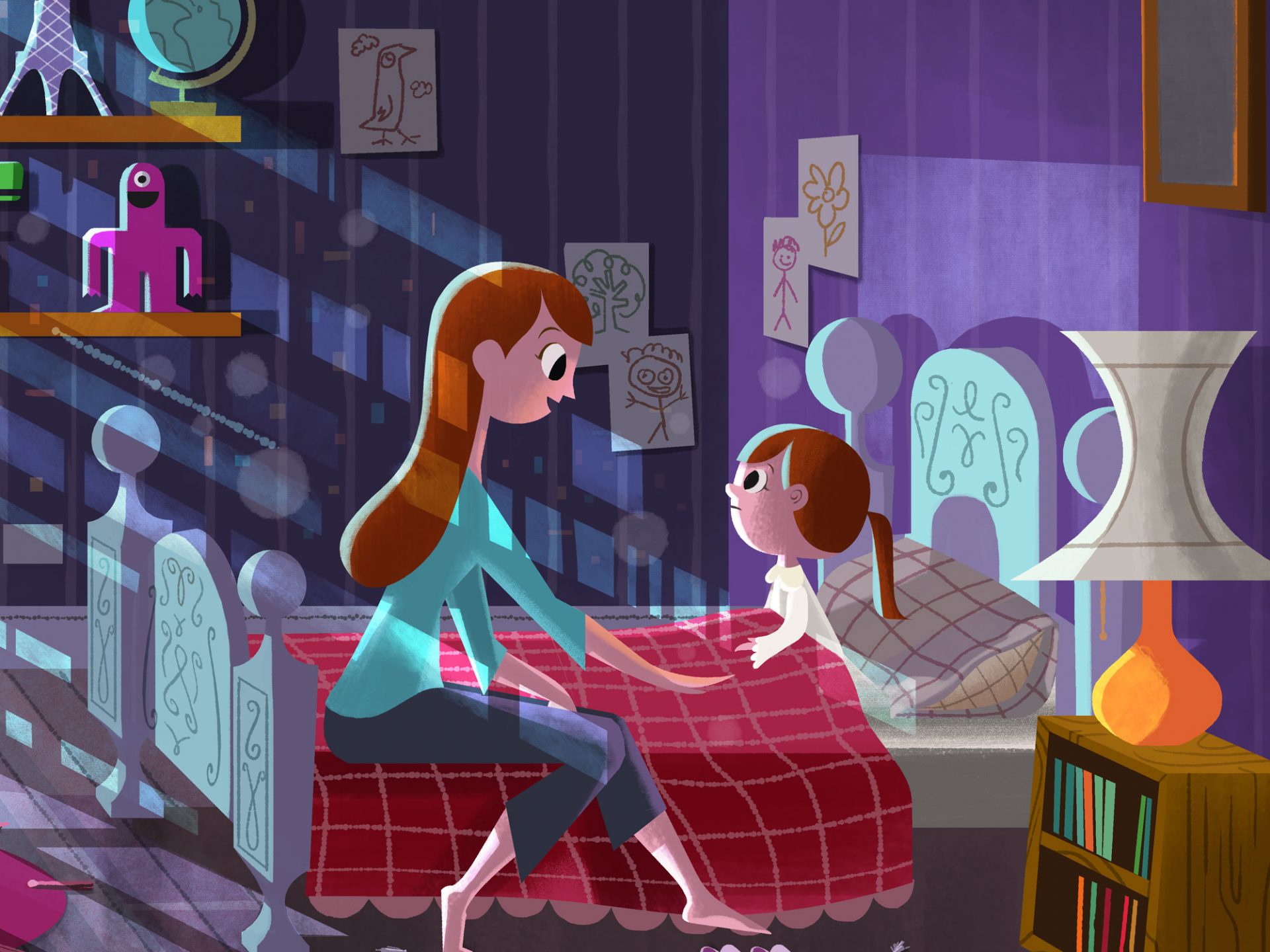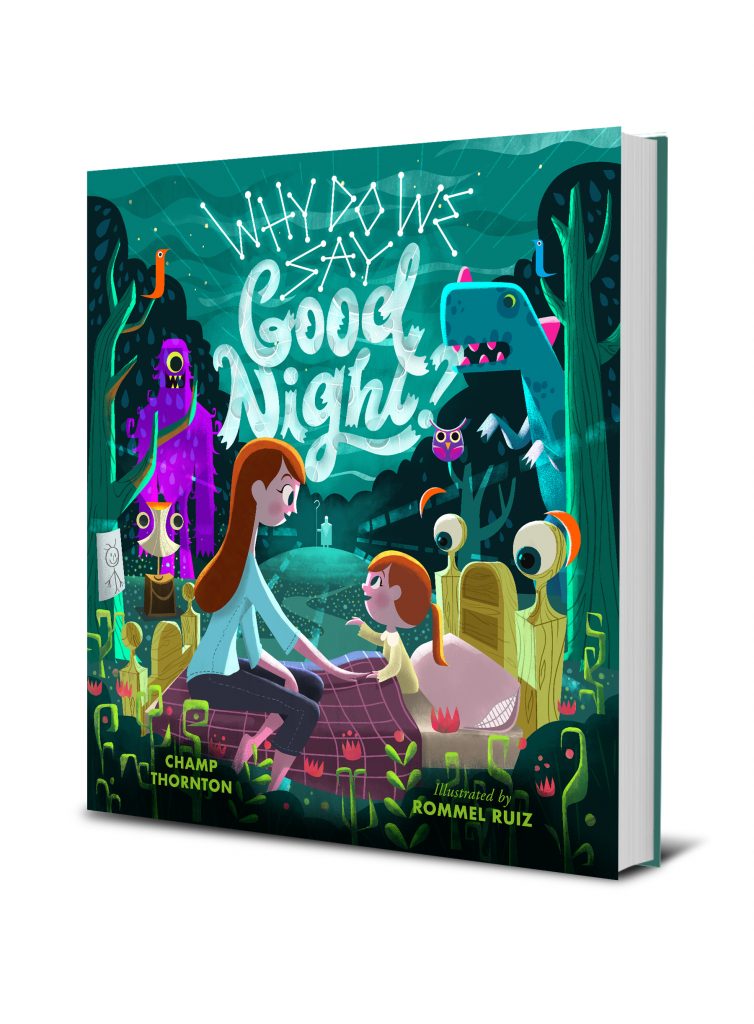Going to bed and turning out the lights can be a hard time for many children. It’s scary when you can’t see what is around you and your mom and dad leave the room. To help parents comfort and encourage their little ones at bedtime, award-winning author Champ Thornton has written Why Do We Say Good Night?
Beautifully designed and illustrated by Rommel Ruiz, Why Do We Say Good Night? tells the story of a mother and daughter as they begin their nightly bedtime routine. The little girl doesn’t like the night, especially when it’s dark and she cannot see. In her mind, night is bad, so she asks, “Why do you say good night to me?” What follows is a sweet conversation between the two in which her mother shares three truths about God to calm her daughter’s fears:
- God created night, so night is good
- God sees all, even in the dark, and is watching through the night
- God is always near and protects us as we sleep
In this interview with Champ Thornton, we talk more about his inspiration and his own fears.
Q: What was the inspiration behind Why Do We Say Good Night? Did any of your children (or you as a child) have a fear of the dark?
I remember what it was like as a child to be frightened at night. As I recall on one occasion, I was convinced that there were snakes in my bed, down near my feet. Thankfully, my parents came, turned on some light, and pulled back the covers so I could see that there was nothing to fear. And as a parent, one of my own children has especially struggled with nighttime fear. The conversations that we’ve had have made me go back to what the Bible says about being afraid and about the night. These bedtime discussions fed into the main truths this book aims to communicate to little children.
Q: What are the three truths about God you share with children in the book?
As a parent, I know that especially with little children, bedtime can be a scary time. It’s dark, and they’re left in their room by themselves. Nightlights are helpful, but it’s the light of God’s Word that shines the brightest in these moments. When our kids were little I wanted them to know that the Lord was with them; he is the good Shepherd who loves his sheep. And he’s the one who made the dark; nighttime was his very good idea. Not only that but God can see in the dark just as clearly as in the daylight. Even though we can’t see, he can see perfectly. So this book is something that parents can read to very young children at bedtime to gently acknowledge their fears and point their hearts to the Lord.
Q: What were some places where you found inspiration for this book?
One phrase in the book, has its roots in one of the most famous lives from church history. The phrase which the mother in the book speaks to the daughter, “You need not fear,” is adapted from the last words of the theologian Jonathan Edwards. On his deathbed, he turned to his family and friends who had gathered around him, and to those who were so fearful of losing the one they loved so much, he said, “Trust in God, and you need not fear.” Those words have always resonated with me, and I’m glad to be able to have a small part in passing them along to some in the next generation.

Q: We are told over and over in the Bible to not fear. It’s easy to say, “Don’t be scared,” but how do we convince our kids to not fear?
The command “Do not fear” appears throughout Scripture, but it rarely appears alone. Take as an example, Isaiah 41:10: “Do not fear, for I am with you; do not be afraid, for I am your God. I will strengthen you; I will help you; I will hold on to you with my righteous right hand” (CSB). This verse contains two of the Scripture’s many “don’t fear” commands. But the rest of the verse doesn’t just issue commands; it informs. It doesn’t merely tell you what to feel, but also what is real. And this helps guide our thinking and our imagination to not be as full of fear. So, my hope for this book is to pass along to parents some ideas for what could be said at bedtime, not just to remove fears, but to point fearful hearts, even very young fearful hearts, to the Lord.
Q: Here’s a question just for fun: What were you scared of as a child?
A couple memories come to mind. Of course there were nightmares every so often. There was one I still remember. In the dream some shadowy person appeared in the doorframe of my room. I remember feeling so scared that I couldn’t move. But other than that, it was silly stuff—scared to take a fish off a hook because I knew he would stab me with his fin. Or being scared walking into the house at night. My imagination could just picture something would jump out of the bushes—so walking up the driveway became running up the driveway.
Q: Why is it important to start talking to your children about theological ideas at a young age? How do you start introducing big ideas to them in a way they can understand?
As a general rule, I think children are able to process more than we might typically give them credit for. We just need to know how to communicate with them. The first step, I think, is to know what their needs and fears are. Then to have a real clear idea of what the Lord says about it. What is true about God—what he’s like, what he’s done—that speaks to the issue my child is experiencing? Then I need to speak to them clearly and simply—using basic words. Instead of “God is omnipotent” or even “God is all-powerful,” you could say “Nothing is stronger than God—nothing! He’s stronger than every animal, every person, everything you can imagine!”
Q: What are some of the best times to start working these conversations into your families’ daily routines?
I love how the Bible talks about parent-child conversations about God. Deuteronomy 6 reminds us that these God-talks can and should be a normal part of everyday conversations. So, there’s really no time that’s too early. And it can just be part of the trip to school or the grocery store, or over breakfast or dinner. For example, you can be driving past a yard that has flowers in it and you’re your kids, “Why do you think God dresses up something a simple as grass with such pretty flowers?” Then, after some discussion, you can add, “Did you know that God tells us that if he takes care of grass—even making it look beautiful, that he’ll take care of you? What’s more important people or grass?” (Kids: people!) “Yes, God agrees with you. He will always take care of us.” In a sentence, the Bible reminds us that parents need to talk, talk, talk. No one else is going to have the opportunity to disciple your children like you do.
Q: What are some of the nightly routines your family participated in when your children were little? How about now as they have outgrown story time?
Until our children were around 11-12 years old we would tuck them into bed at night. This routine would include some brief conversation, especially if the child had something to talk about (and wasn’t just stalling for time). Then we would pray together. Sometimes, we would even pray with the child for specific issues we had been praying for that child: “Lord, would you please help [child’s name] not just obey, but to want to obey? ” If there is some struggle with fear, or any other similar issue, we also would take time to talk about it, usually ending by reciting a favorite and applicable passage of Scripture together. Psalm 23 has been a favorite. Then after prayer and any discussion, we say good night.
Q: Why Do We Say Good Night? is your first children’s storybook not based on Bible stories. Was it easier or harder to write than your previous releases?
It was actually easier, though I’m not entirely sure why. My first attempt at this kind of short children’s story, a different take at Why Do We Say Good Night?, was about a little girl who was afraid at nighttime because a traumatic event had recently occurred—her grandfather had passed away. The key idea was going to be that the parent reminded the daughter that we say “good night” because as Christians we never ever have to say good-bye. (This idea came from the fact that often my mom would send me or my siblings off by saying good-night instead of good-bye—just as a tiny reminder that there’s no good-bye for the family of God.) But this previous kids story just didn’t work. As a friend said, it was more like Why is Grandpa Gone? than Why Do We Say Good Night? But there had been a phrase, which kind of rhymed, in this previous story that stuck with me: The Lord made day and he made night, He made all things good and right.” Those lines became the seed which turned into the finished book—not about losing a grandparent but about struggling with nighttime fears.
WHY DO WE SAY GOOD NIGHT? WHEN YOU ARE AFRAID OF THE DARK
Going to bed and turning out the light can be a hard time for many children. Award-winning author Champ Thornton wrote this beautifully designed and illustrated book to help parents comfort their children with three truths about God. Children and parents will want to start a new nighttime tradition of reading together about why we can say that the night is good.






